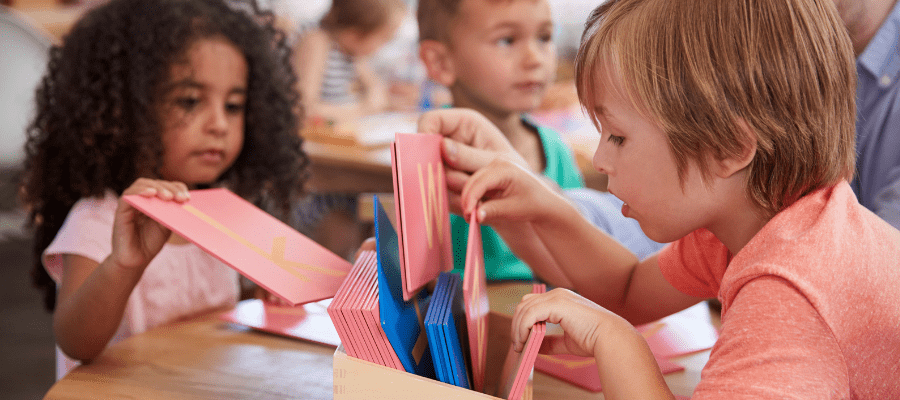
Visitors to a Montessori nursery often comment on how the children seem to be so independent, and satisfied and joyful in what they are doing. Maria Montessori’s understanding of human development is at the heart of this. By understanding what children need, we can prepare environments that support their development, meet their interests, and enable them to flourish.
One aspect of Montessori philosophy that guides Montessori teachers is the Human Tendencies. Maria Montessori believed that rather than instincts, human beings have ‘tendencies’, which push us into interacting with our environment. The ‘Human Tendencies’ help us to understand how children access the world around them and guide us in preparing the right environment for them.
The first of the Tendencies are connected with exploration – Montessori observed that children need to explore the world around them and orientate themselves to it. This guides Montessori teachers to prepare environments for children that give them the freedom to explore, to make discoveries and learn new things. If we are to help children find their way as explorers we need to offer them an environment that contains a sense of order and contains points of reference. This means having a space that doesn’t change constantly, and where children find security from knowing where to find what they need. The second group of Human Tendencies are connected with movement, work and repetition.
As human beings and living creatures, we need to move. We also need to work – this isn’t about financial gain – it is about working for our shelter, our food, our survival, and even for enjoyment! Repetition is how we learn and master new skills. We are therefore guided to prepare a nursery environment that offers freedom of movement, and the freedom to repeat activities and experiences as much as they would like to. Montessori teachers give children the opportunity to immerse themselves in work – as the saying goes, ‘play is the work of childhood’.
Next we have a group of tendencies relating to social life. Children have a need to socialise, communicate, develop group and community rules, and build relationships. This knowledge helps us to ensure our nursery environments facilitate communication and socialisation, as well as enabling children to develop an understanding of community and respect for each other. Mixed age groupings, a feature of Montessori nurseries and schools, helps this enormously as children of different ages work and play alongside each other, learning from each other.
The fourth group of tendencies relate to having a mathematical mind. Montessori explained that children need an environment which supports their innately mathematical way of thinking and their growing ability to think in the abstract. The Montessori materials support this through bringing abstract concepts to life in resources that are sensorial and ‘hands on’ by nature.
Finally, we have Human Tendencies that connect to our spiritual needs. How this finds expression will look different for each of us, but reminds us to give children the opportunity to experience art, music, dance, and for some children and families will also involve religious beliefs. Our Montessori nurseries must come alive – we should share real art with the children, real music (not just recorded nursery rhymes!), and offer them the chance to lose themselves in self-expression through the arts.
As a Montessori teacher or nursery, one way to utilise this knowledge of the Human Tendencies is to use them as a reflective tool. Keep a note of the different tendencies handy, and reflect regularly as a team on how they find expression in your indoor and outdoor environments. This enables us to constantly prepare an appropriate, satisfying and joyful early years environment for young children.